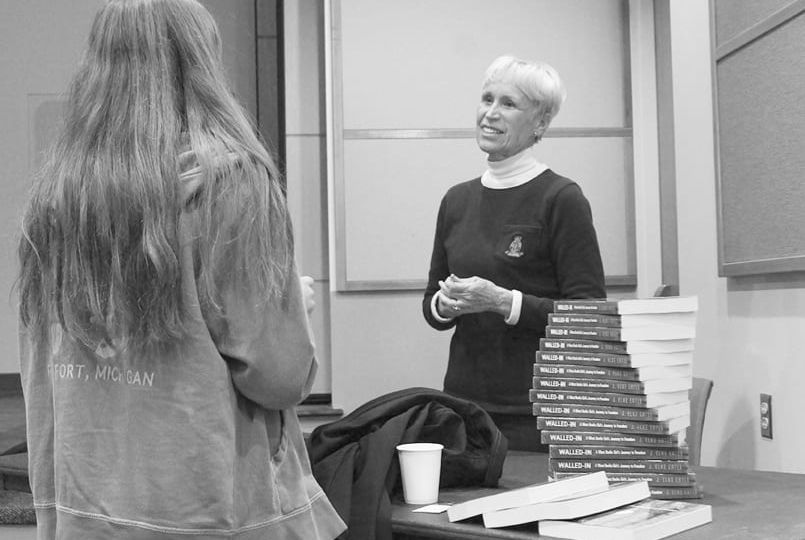
J. Elke Ertle, author of the memior Walled In: A West Berlin Girl’s Journey to Freedom, spoke to St. Olaf students and staff on Sept. 11 about what it was like to grow up in a postwar Berlin and witness the Berlin Wall being constructed.
“By the time I was born, 40 percent of the city had been destroyed,” Ertle said during the opening slides. “This is what my parents’ apartment looked like when I was born.”
It was a picture of nothing more than rubble and debris.
At the Potsdam Conference, there was an international agreement to reduce Germany’s power. The country was divided, its industry was contained, and its military was significantly reduced.
Almost all the men were either dead, missing, taken as war prisoners or simply had not yet returned from war. This left the women to rebuild the city from the rubble, and the term “Trümmerfrauen” emerged, literally translating to “rubble women.”
Ertle grew up in very rough conditions. She lived in a little house with eleven other relatives who all shared the same bathroom. Despite this and the conditions of the city at the time, Ertle remembers her childhood as surprisingly cheerful.
“I never felt that anything was wrong, because that’s all I knew growing up. To me, that was just the way life was supposed to be,” she said. To illustrate this point, she showed a picture of herself as a baby wearing a dress and pointed out that her mother had sewn it out of a fallen parachute.
The Allies originally tried to revert Germany to an agrarian society. Fortunately for the German people, the Allies realized that the economies of many European countries depended on German industrial production.
At some point, due to all the trade restrictions and complications, the economy reverted to a primitive barter system, where everything was handled on the black market. A currency reform was necessary. New money was printed in the U.S., and approximately 23,000 crates full of cash were shipped to Germany. The crates needed to be labeled as something less valuable so people would not bother stealing it, but almost everything during this postwar period was scarce and therefore of value.
“What do you think they labeled it?” Ertle asked, her question met with silence and head scratching. “Door knobs, because that was one thing people certainly didn’t need.”
So the U.S.-printed dollars began circulating, which upset the Soviets. They started cutting off trade routes, halting Berlin’s supply of food and coal. Ertle recalls only having electricity for two hours a day during that time. The city’s resources were dwindling and it was starting to look as if everyone was going to starve. That was when the western Allies organized the Berlin Airlift in 1948.
Ertle remembered how, at some point, there was a plane landing every three minutes with food and supplies. The skies were full, and the city had to extend its airports and build new ones to accommodate the large size of the fleet sent to its aid.
There was a particular pilot who wanted to do something extra to raise the morale of children growing up during those difficult times. He promised to drop treats from his plane the next day. Due to the number of planes landing all the time, they asked how they would be able to identify his plane. He told them he would “wiggle his wings” as he flew so they’d know.
That is how Gail Halvorsen became known as “Uncle Wiggly Wings,” dropping his chocolate rations in little parachutes to the children. Soon other pilots followed, and they were affectionately named “The Candy Bombers.”
The presentation took a personal turn from then on as Ertle reflected on her own life during these events. She mentioned that her novel juxtaposed these historical events with her own personal adversities. She began reading a few pages about how it felt waking up one day and hearing on the radio that there were blockades and barbed wire across the city. The wall was going up, one brick at a time. There was also a wall going up between Ertle and her parents. She had always acquiesced to their demands, until one day her parents forbid her from continuing to see a boy she liked.
She rebelled and had a clandestine relationship with him. At first, she could not tell whether whether she liked him or simply continued the relationship as an act of rebellion. She then revealed that the boy was present in the room. It was her husband. It was a rather emotional moment that sparked a spontaneous round of applause from the audience.
The session ended with Ertle signing copies of her book to student and faculty members.
shehat1@stolaf.edu
Photo Credit: KALYN DORHEIM/MANITOU MESSENGER

